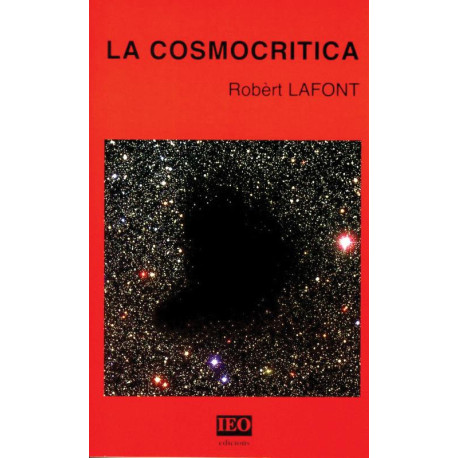Recently added item(s)
No products
Product successfully added to your shopping cart
There are 0 items in your cart. There is 1 item in your cart.
Nouvelles
- New Selection
- Books
- Music
- Videos - DVD
- Miscellaneous
- Revues, Journaux
Links
La cosmocritica - Robèrt Lafont
L-9782859104337
New
1 Item
Available
10,00 €
La cosmocritica - Robèrt Lafont's latest collection of short stories (Dètz istòrias pèr nòstre temps): delightful fantasy, humor, irony... Voltaire's smile floating over today's world, including his scientific and technical knowledge. IEO edicions.
Data sheet
| Type | Paperback |
| Year | 2008 |
| Language | occitan (provence) |
| Pages | 154 |
| Format | 11 x 18 cm |
| Distributor | IEO edicions - IDECO |
| ISBN | 978-2-85910-433-7 |
More info
La cosmocritica - Robèrt Lafont
Dètz istòrias pèr nòstre temps
These ten stories for our time are a shortcut through the entire history of mankind... or almost, from the origin of life to the final apocalypse.
You'll see, for example, how cockroaches are a draft from the Creator (Lei babaròtas) and what happened to a particle gas pedal under construction in Canjuers (La malaventura dau trauc negre). You'll learn that Homo erectus wasn't made to stand upright and that the fossil skull found at Fontségugne was that of a double-brained being (L'òme de Fontsegunha)...
The book ends with an oil war that turns into a nuclear war (Lo mond segon George W. Bush Jr).
Fortunately, a few humans survive the catastrophe, including the narrator - of course, who else would be telling all this? But, he says, all these stories are just fariboles.
Poppycock, really?
Robert Lafont is a poet, philosopher and storyteller, perfectly attuned to current events at the start of the 21st century. With a smile on his face, he confronts us with the nonsense and nothingness of our world.
IEO Edicions.
The author:
Robert Lafont (Nîmes, March 16, 1923 - Florença (Itàlia), June 24, 2009) was a poet, thinker, essayist, linguist, playwright, historian (of literature and medievalism), politician, novelist, polyglot... and a great lover of the Occitan language! Lafont's Occitan probably came from his grandparents, both from Nîmes, with whom he spent vacations and perhaps even some school years.
Extract:
The book begins:
"Èra un tèms ont l'umanitat pensadissa e educada, que cèrca totjorn garrolha a l'òrdre naturau dei causas, se pausava una question gaire nòva, mai qu'amb lo progrès dei coneissenças veniá tissosa e mai angoissosa, en fasènt coma un trauc dins lo plen dau sabentitge : queta es l’origina de la vida ? Coma vai que nòstre planèta que vira colhon sus son orbita, dins un sistèma solar que Copernic a tan bèn mes a l’ora, aga recebut aquela beluga que tremuda la calama universala, lo bèu dormir dau minerau e lo sangflac dei placas continentalas e, non contènta de metre aqueu sabèm pas qué au cueu deis amibes que lei fai trefolir, se permet de giblar lo tèmps ai ratigàs de l’evolucion e, coma foguèt provat pèr lo sénher Darwin, amb una traça d’elipsoïd finís per faire una cacalausa e amb un morre de monina un sorire escalugant per la Rice." (p. 7)
Translation: "It was a time when thinking, educated mankind, always quarrelling with the natural order of things, was asking itself a question that was hardly new but which, with the progress of knowledge, was becoming annoying and even distressing, like a hole in the fullness of knowledge: what is the origin of life? How is it that our planet, spinning stupidly in its orbit, in a solar system that Copernicus set so well, has received this spark that metamorphoses the universal calm, the good sleep of the mineral and the phlegm of the continental plates and, not content with putting that je ne sais quoi up the asses of amoebas that makes them twitch, allows itself to bend time to the accesses of evolution and, as was proved by Monsieur Darwin, ends up turning an ellipsoid rag into a helix and a guenon's snout into a sparkling smile by data coding. "
Reviews
No customer comments for the moment.
 English
English Français
Français Occitan
Occitan








